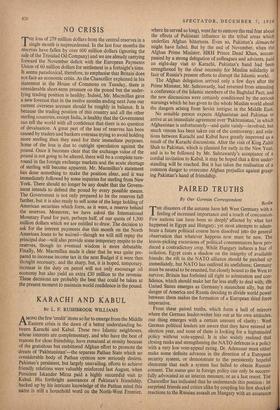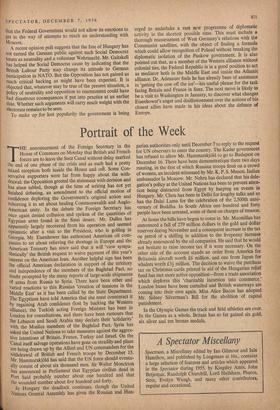PAIRED TRUTHS
By Our German Correspondent
Berlin THE disasters of the autumn have left West Germany with a feeling of increased importance and a touch of concussion. Few nations can have been so deeply' affected by what has happened in Egypt and Hungary; yet most attempts to adum- brate a future political course have dissolved into the general observation that whatever happens now must be new. The lesson-picking excursions of political commentators have pro- duced a contradictory crop. While Hungary induces a fear of isolation, Egypt casts a shadow on the integrity of available friends; the rift in the NATO alliance should be patched up immediately, but NATO has outlived its usefulness; Germany must be neutral to be reunited, but closely bound to the West to survive; Britain has forfeited all right to admiration and con- fidence, which should make her far less stuffy to deal with; the United States emerges as Germany's staunchest ally, but the danger of America and Russia deciding to divide world power between them makes the formation of a European third force imperative. • From these paired truths, which form a hall of mirrors where the German leader-writer hits out at his own attitudes, one thing emerges with a certain amount of clarity : West German political leaders are aware that they have entered an election year, and none of them is looking for a highminded policy without vote-appeal. It is also widely realised that closing ranks and strengthening the NATO defences is a policy with a very low vote-appeal rating. Dr. Adenauer must either make some definite advance in the direction of a European security system, or demonstrate to the persistently hopeful electorate that such a system has failed to obtain Russian consent. The status quo in foreign policy can only be success- fully advocated as an interim measure, or as a last resort. The Chancellor has indicated that he understands this position : he surprised friends and critics alike by coupling his first shocked reactions to the Russian assault on Hungary with an assurance that the Federal Government would not allow its emotions to get in the way of attempts to reach an understanding with Moscow.
A recent opinion poll suggests that the fate of Hungary has not turned the German public against such Social Democrat tenets as neutrality and a volunteer Wehrmacht. Mr. Gaitskell has helped the Social Democrat cause by indicating that the British Labour Party may change its attitude to German Participation in NATO. But the Opposition has not gained as much critical backing as might have been expected. It is objected that, whatever may be true of the present situation, a Policy of neutrality and opposition to rearmament could have had disastrous consequences if put into practice at an earlier date. Whether such arguments will carry much weight with the electorate remains to be seen.
To make up for lost popularity the government is being urged to undertake a vast new programme of diplomatic activity in the shortest possible time. This must include a thorough reassessment of West Germany's relations with the Communist satellites, with the object of finding a formula which could allow recognition of Poland without breaking the diplomatic isolation of the Pankow government. It is also pointed out that, as a member of the Western alliance without colonial ties, the Federal Republic is in a good position to act as mediator both in the Middle East and inside the Atlantic alliance. Dr. Adenauer feels he has already been of assistance in 'getting the cow off the ice'—his useful phrase for the task facing Britain and France in Suez. The next move is likely to be a visit to Washington in January, to discover what changes Eisenhower's anger and disillusionment over the actions of his closest allies have made in his ideas about the defence of Europe.



































 Previous page
Previous page